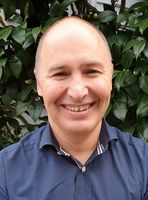Central Auckland, East Auckland, North Auckland, South Auckland, West Auckland > Private Hospitals & Specialists >
Bexley Clinic
Private Service, Psychiatry, Mental Health
Today
9:00 AM to 5:00 PM.
Description
Our group of Psychiatric Specialists and Senior Clinical Psychologists also serve or have served in the public sector as consultants. We are all committed to the Medical Council's principles of confidentiality and ethical behaviour and to the ongoing continuing educational post graduate programs monitored by the Royal College of Australian and New Zealand Psychiatrists and recognised for vocational registration by the Medical Council.
The expertise of the Clinic's members covers a wide variety of patients' problems. This is predominantly in anxiety disorders but includes the following:
- Psychiatric Disorders, emotional distress related to life situations, marital problems, drug and alcohol dependency.
- Medico-legal reports to a number of institutions e.g. ACC.
- Reports for legal counsel on behalf of those facing charges or seeking compensation.
- War Pensions.
- Competence assessments for the Protection of Personal and Property Rights Act, more specifically for the elderly related to wills and their validity.
Consultants
-

Dr Patrick Daniels
Psychiatrist
-

Dr Katie Ritchie
Psychiatrist
-

Dr Alexa Srzich
Psychogeriatrician and Psychiatrist
-

Dr Russell Wyness
Psychiatrist
Referral Expectations
Although professional referrals are preferred, self referrals may be accepted.
Fees and Charges Categorisation
Fees apply
Fees and Charges Description
Initial consultation charges vary. For indicative prices please phone (09) 520 5280.
Hours
9:00 AM to 5:00 PM.
| Mon – Fri | 9:00 AM – 5:00 PM |
|---|
Procedures / Treatments
We all feel some anxiety at some time or other. Anxiety may serve as an alerting signal, warning us of external /internal threats and consequently acting as a prompt to take appropriate action. When anxiety is very severe and present even when there is no threat of any kind, then it interferes with our functioning and can become an illness. In this circumstance, anxiety becomes a disorder characterised by an unpleasant emotion with feelings of fear, threat and impending danger and can be associated with numerous bodily symptoms like breathlessness, trembling, tightness in throat, dry mouth, racing heart and nausea/vomiting. There are varieties of anxiety disorders like panic attacks, phobias (unhealthy fear of something), agoraphobia (fear of open spaces), social anxiety, post-traumatic disorder and obsessive compulsive disorder. Anxiety can often be associated with a depressive episode. Anxiety disorders are very common and if unrecognised and untreated, can cause severe disability. Treatment Self help: learning techniques like relaxation, distraction and education Cognitive Behavioural Therapy (CBT) Medication.
We all feel some anxiety at some time or other. Anxiety may serve as an alerting signal, warning us of external /internal threats and consequently acting as a prompt to take appropriate action. When anxiety is very severe and present even when there is no threat of any kind, then it interferes with our functioning and can become an illness. In this circumstance, anxiety becomes a disorder characterised by an unpleasant emotion with feelings of fear, threat and impending danger and can be associated with numerous bodily symptoms like breathlessness, trembling, tightness in throat, dry mouth, racing heart and nausea/vomiting. There are varieties of anxiety disorders like panic attacks, phobias (unhealthy fear of something), agoraphobia (fear of open spaces), social anxiety, post-traumatic disorder and obsessive compulsive disorder. Anxiety can often be associated with a depressive episode. Anxiety disorders are very common and if unrecognised and untreated, can cause severe disability. Treatment Self help: learning techniques like relaxation, distraction and education Cognitive Behavioural Therapy (CBT) Medication.
- Self help: learning techniques like relaxation, distraction and education
- Cognitive Behavioural Therapy (CBT)
- Medication.
Depression is a mood disorder. Emotional states like sadness, ‘feeling blue’ or tearfulness are part of normal human experience. Clinical depression is called Major Depression and is characterised by the presence for at least two weeks of symptoms such as depressed mood, diminished interest and pleasure in most activities, change in appetite and weight (these can be increased or decreased) sleep disturbance, fatigue, bodily symptoms (headache, backache etc) poor concentration, feelings of anxiousness, worthlessness, hopelessness, guilt, and suicidal ideation. Depression is a common disorder and about 10-20 % of the population in New Zealand will suffer from depression during their lifetime. Treatment Once depression has been diagnosed by your GP/Psychiatrist, it can be effectively treated by: Antidepressant medication Psychological interventions e.g. counselling (various types) and psychotherapy (talking therapy which is of various types).
Depression is a mood disorder. Emotional states like sadness, ‘feeling blue’ or tearfulness are part of normal human experience. Clinical depression is called Major Depression and is characterised by the presence for at least two weeks of symptoms such as depressed mood, diminished interest and pleasure in most activities, change in appetite and weight (these can be increased or decreased) sleep disturbance, fatigue, bodily symptoms (headache, backache etc) poor concentration, feelings of anxiousness, worthlessness, hopelessness, guilt, and suicidal ideation. Depression is a common disorder and about 10-20 % of the population in New Zealand will suffer from depression during their lifetime. Treatment Once depression has been diagnosed by your GP/Psychiatrist, it can be effectively treated by: Antidepressant medication Psychological interventions e.g. counselling (various types) and psychotherapy (talking therapy which is of various types).
- Antidepressant medication
- Psychological interventions e.g. counselling (various types) and psychotherapy (talking therapy which is of various types).
This is a mood disorder in which both depressive (persistent low mood) and manic (elevated or high mood) episodes are experienced. It is usually a recurring (i.e. keeps coming back) disorder that can cause a lot of havoc in all aspects of a person’s life. People with this disorder will experience periods of extreme mood changes but also periods of stable mood during which they may be able to return to everyday routines. These changes of mood can be very extreme and occur for no apparent reason. Different people will experience this disorder in different ways; some may have few episodes, others many, and symptoms may vary from mild to severe. When severely depressed or elevated, a person can become ‘psychotic’ i.e. lose touch with reality. Treatment Usually by medication (antidepressants if depressed and mood stabilisers if depressed and manic) A combination of counselling and psychotherapy (‘talking therapy’) may hasten recovery Hospitalisation may be required for those who are very unwell and are posing a risk to themselves or to others.
This is a mood disorder in which both depressive (persistent low mood) and manic (elevated or high mood) episodes are experienced. It is usually a recurring (i.e. keeps coming back) disorder that can cause a lot of havoc in all aspects of a person’s life. People with this disorder will experience periods of extreme mood changes but also periods of stable mood during which they may be able to return to everyday routines. These changes of mood can be very extreme and occur for no apparent reason. Different people will experience this disorder in different ways; some may have few episodes, others many, and symptoms may vary from mild to severe. When severely depressed or elevated, a person can become ‘psychotic’ i.e. lose touch with reality. Treatment Usually by medication (antidepressants if depressed and mood stabilisers if depressed and manic) A combination of counselling and psychotherapy (‘talking therapy’) may hasten recovery Hospitalisation may be required for those who are very unwell and are posing a risk to themselves or to others.
- Usually by medication (antidepressants if depressed and mood stabilisers if depressed and manic)
- A combination of counselling and psychotherapy (‘talking therapy’) may hasten recovery
- Hospitalisation may be required for those who are very unwell and are posing a risk to themselves or to others.
Schizophrenia is a serious mental disorder that affects about 1% of the general population. It is a complex illness characterised by ‘psychosis’, a word used to describe disorder of thoughts (e.g. delusions - false beliefs held in spite of evidence that they are not real), perceptions (e.g. hallucinations - seeing, hearing or feeling things which are not there), disorganised speech and grossly disorganised behaviour, which are not experienced by others and which are not seen as abnormal by the sufferer. These four symptoms are often referred to as the ‘Positive Symptoms’ of schizophrenia because they are the result of the disease process. The fifth group of symptoms: withdrawal, decreased ability to feel pleasure, lack of energy, and flat affect, are referred to as ‘Negative Symptoms’ because they represent a loss of normal functions. Schizophrenia affects different people in different ways. Some people may experience only a few short episodes and then fully recover. For others it lasts throughout their lives and needs to be treated like any other physical illness such as asthma or diabetes. It is important that schizophrenia is treated as soon as it is diagnosed by a psychiatrist to prevent long-term disability and loss of function. Treatment Schizophrenia may be treated using a number of different approaches: Use of antipsychotic medication Psychosocial education programs e.g. education, support, counselling and assistance to return to job/studies/performing daily tasks Ongoing support e.g. housing, monitoring of treatment, support groups.
Schizophrenia is a serious mental disorder that affects about 1% of the general population. It is a complex illness characterised by ‘psychosis’, a word used to describe disorder of thoughts (e.g. delusions - false beliefs held in spite of evidence that they are not real), perceptions (e.g. hallucinations - seeing, hearing or feeling things which are not there), disorganised speech and grossly disorganised behaviour, which are not experienced by others and which are not seen as abnormal by the sufferer. These four symptoms are often referred to as the ‘Positive Symptoms’ of schizophrenia because they are the result of the disease process. The fifth group of symptoms: withdrawal, decreased ability to feel pleasure, lack of energy, and flat affect, are referred to as ‘Negative Symptoms’ because they represent a loss of normal functions. Schizophrenia affects different people in different ways. Some people may experience only a few short episodes and then fully recover. For others it lasts throughout their lives and needs to be treated like any other physical illness such as asthma or diabetes. It is important that schizophrenia is treated as soon as it is diagnosed by a psychiatrist to prevent long-term disability and loss of function. Treatment Schizophrenia may be treated using a number of different approaches: Use of antipsychotic medication Psychosocial education programs e.g. education, support, counselling and assistance to return to job/studies/performing daily tasks Ongoing support e.g. housing, monitoring of treatment, support groups.
Schizophrenia is a serious mental disorder that affects about 1% of the general population. It is a complex illness characterised by ‘psychosis’, a word used to describe disorder of thoughts (e.g. delusions - false beliefs held in spite of evidence that they are not real), perceptions (e.g. hallucinations - seeing, hearing or feeling things which are not there), disorganised speech and grossly disorganised behaviour, which are not experienced by others and which are not seen as abnormal by the sufferer. These four symptoms are often referred to as the ‘Positive Symptoms’ of schizophrenia because they are the result of the disease process.
- Use of antipsychotic medication
- Psychosocial education programs e.g. education, support, counselling and assistance to return to job/studies/performing daily tasks
- Ongoing support e.g. housing, monitoring of treatment, support groups.
Document Downloads
- Julian Reeves: Profile.pdf (PDF, 35.2 KB)
- Rajan Gupta: Profile.pdf (PDF, 110.9 KB)
Public Transport
The Auckland Transport Journey Planner will help you to plan your journey.
Parking
Parking available on site
Pharmacy
The closest pharmacy is at Ascot Integrated Hospital which is located at
- 90 Greenlane East, Remuera
Website
Contact Details
9 Green Lane East, Remuera, Auckland
Central Auckland
9:00 AM to 5:00 PM.
-
Phone
(09) 520 5280
Email
Website
9 Green Lane East
Remuera
Auckland 1050
Street Address
9 Green Lane East
Remuera
Auckland 1050
Postal Address
PO Box 87207
Meadowbank
Auckland 1742
Was this page helpful?
This page was last updated at 12:27PM on March 18, 2025. This information is reviewed and edited by Bexley Clinic.

